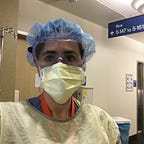A Stone to Beat COVID-19
Hope through collaboration, connection, and community.
The isolation breaks your heart.
Spouses both hospitalized with COVID-19 but unable to see each other, sometimes having brief minutes to say goodbye as one is taken to intensive care or passes away.
Grandparents finding ways to say goodbye to their children and grandchildren from their hospital room over the phone.
Countless phone calls by doctors and nurses relaying messages to loving family members of patients in isolation wards with COVID-19, because for public safety, relatives are not always permitted to visit.
These are a just a few of the heart wrenching moments of humanity overcoming the isolation imposed by COVID-19 infection that we have been witnessing in hospitals in Washington State and beyond.
COVID-19 hits us hard as a species because of our interconnectedness. Isolation is a requisite part of the response to the pandemic: isolation of patients by infection control measures in hospitals, limiting family visitors at times of our greatest need for a loved one’s hand to hold, isolation of elderly parents from their communities, social distancing, quarantines, lock downs, closed borders.
We are the underdogs in this battle against a behemoth virus, SARS-CoV-2. As we face limited resources and an overwhelming strain on our health system, how do we find hope in this battle? How do health care workers come home from work and not feel completely devastated? How do patients and families find the courage to recover from the emotional effects of such brutal isolation even when physical recovery is possible? How do we face the grief of losing a family member or colleague to this virus?
We can reframe connection and come together.
What we in the US saw happening in Asia and Italy as spectators, we now are living in as actors. We now speak of shared experiences. We understand how it feels to look down the barrel of complete uncertainty, face to face with our mortality.
I met my husband during a cholera outbreak in a remote area of the jungle in the Democratic Republic of Congo. Despite eroding health infrastructure, his team quickly controlled the outbreak. He chose to become a physician to save lives in the face of a near constant public health emergency, with great risk to his physical safety. He works in crises from war and displacement, to cholera, measles, malaria, and Ebola, and often more than one emergency simultaneously, year in and year out. For me, that fateful cholera outbreak was temporary, knowing that I would get on a plane and depart from it. This is different.
I came home from my first week of work in this COVID-19 outbreak as a hospital physician near Seattle exhausted, and asked him, how does he find the strength to work in constant emergency without end in sight?
His answer: hope and solidarity. Not hope because he is naïve in the face of facts that are not reassuring. Rather it is because he has seen hope in action, the mobilization of all within a community to defeat Goliath after Goliath, to find a way forward when society is shaken, to do a lot with a little, and to survive against all odds.
I have witnessed in this fight the value of connecting. The value of connecting patients with their families despite strict isolation measures, of coming together as a team of health care workers to organize and advocate for our community. My brother, an entrepreneur in China, used his network to connect me to physicians throughout China with clinical experience treating patients with COVID-19, which has helped my team care for patients here, as we were among the first responders in the U.S.
We can all do something.
It is one thing to ask people to stay home. It is another to mobilize the capacities of everyone in our communities to support us in this battle, even from our homes. It is another to mobilize all of us who may not have homes, food security, or smartphones. With our community behind us, knowing our needs on the front line, we all come to fight together. Our community assets, by valuing them and remaining hopeful, are our stones to beat this disease, and to overcome the isolation imposed by this Goliath.
I had the joy of calling the spouse of a patient last week who successfully came off the ventilator and was recovering. They would soon be able to hear each other’s voices by phone. Again, I am reminded of why we do this work, why we stay hopeful despite the odds of what we are up against.
